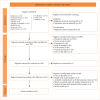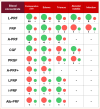Blood concentrates for controlling postoperative complications from third molar surgeries: a scoping review
- PMID: 40802354
- PMCID: PMC12333574
- DOI: 10.1590/acb405825
Blood concentrates for controlling postoperative complications from third molar surgeries: a scoping review
Abstract
Purpose: To map the literature on blood concentrates for managing postoperative sequelae after third molar extraction through a scoping review.
Methods: MedLine, Latin American and Caribbean Health Sciences Literature, Scientific Electronic Library Online, EMBASE, Cochrane Library, Scopus, and Web of Science were the search databases. MedRxiv and EASY provided the grey literature. The investigation included observational studies and clinical trials reporting at least one postoperative sequela. After selecting the articles, the extracted data included study author, year, and country, study design, sample size, age distribution, the type of third molar impaction, flap design, the presence of osteotomy and/or odontosection, co-interventions, blood concentrate type, centrifuge model, centrifugation protocol, collection tubes, outcomes, and the main findings for each outcome. After data extraction, an analysis of the geographic distribution of publications was carried out based on the MapChart website.
Results: This review included 63 studies. The leading countries in publications were Turkey, India, and Brazil. Common postoperative sequelae included pain, edema, trismus, alveolar osteitis, and infection. Outcomes varied regarding the effectiveness of concentrates in controlling inflammation, edema, trismus, and alveolar osteitis. Advanced platelet-rich fibrin was the most applied concentrate in recent studies and was associated with reduced edema and trismus.
Conclusion: All concentrates demonstrated some effectiveness in managing sequelae after third molar extraction, but most did not show significant outcomes in controlling inflammatory signs. It emphasizes the need for further randomized clinical trials and systematic reviews to strengthen the evidence on blood concentrates for managing postoperative sequelae.
Conflict of interest statement
Figures



Similar articles
-
Surgical techniques for the removal of mandibular wisdom teeth.Cochrane Database Syst Rev. 2014 Jul 29;(7):CD004345. doi: 10.1002/14651858.CD004345.pub2. Cochrane Database Syst Rev. 2014. Update in: Cochrane Database Syst Rev. 2020 Jul 26;7:CD004345. doi: 10.1002/14651858.CD004345.pub3. PMID: 25069437 Updated.
-
Do blood concentrates influence inflammatory signs and symptoms after mandibular third molar surgery? A systematic review and network meta-analysis of randomized clinical trials.Clin Oral Investig. 2023 Dec;27(12):7045-7078. doi: 10.1007/s00784-023-05315-5. Epub 2023 Oct 26. Clin Oral Investig. 2023. PMID: 37884621
-
Local interventions for the management of alveolar osteitis (dry socket).Cochrane Database Syst Rev. 2012 Dec 12;12:CD006968. doi: 10.1002/14651858.CD006968.pub2. Cochrane Database Syst Rev. 2012. Update in: Cochrane Database Syst Rev. 2022 Sep 26;9:CD006968. doi: 10.1002/14651858.CD006968.pub3. PMID: 23235637 Updated.
-
Non-steroidal anti-inflammatory drugs versus corticosteroids for controlling inflammation after uncomplicated cataract surgery.Cochrane Database Syst Rev. 2017 Jul 3;7(7):CD010516. doi: 10.1002/14651858.CD010516.pub2. Cochrane Database Syst Rev. 2017. PMID: 28670710 Free PMC article.
-
Fornix-based versus limbal-based conjunctival trabeculectomy flaps for glaucoma.Cochrane Database Syst Rev. 2015 Nov 25;11(11):CD009380. doi: 10.1002/14651858.CD009380.pub2. Cochrane Database Syst Rev. 2015. Update in: Cochrane Database Syst Rev. 2021 Aug 26;8:CD009380. doi: 10.1002/14651858.CD009380.pub3. PMID: 26599668 Free PMC article. Updated.
References
LinkOut - more resources
Full Text Sources

